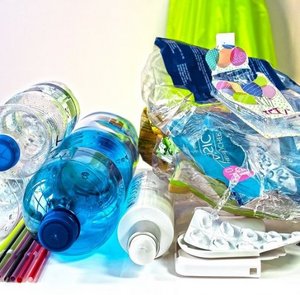
In the framework of the Interreg Europe PLASTECO project, AURA-EE organised an interregional workshop on how to support the regional plastics production and reuse business to invest in eco-innovation.
This online meeting gathered about 50 people and allowed exchanges between public and private actors from the European partner countries.
On the agenda:
- Criteria for public (co-)funding in research and development
- Promote eco-innovation through a network of complementary actors and awareness-raising among
companies - Lifting technological barriers related to eco-innovation to remain competitive, and meet or
anticipate regulatory changes and consumer expectations - Supporting businesses to take advantage of EU-funding
The meeting ended with a workshop on the topics discussed.
Key points to remember :
European and French legislation is increasinglypushing the plastics sector to reduce its environmental impact and better recover its waste in a circular economy logic. In France, the anti-waste law for a circular economy (AGEC, 10/02/2020) sets targets of 100% recycled plastics by 2025 and the end of single-use packaging on the market by 2040. Recycled plastics, perceived as poor quality products, have long been neglected in favour of virgin plastics.
Today, the situation is changing, both in terms of the awareness of the plastics sector and consumer expectations, and in terms of recycling and the integration of recycled plastics technologies. This is shown by the ambitions displayed by stakeholders of the sector, for instance through the MORE label.
However, technical and economic difficulties persist for recyclers and plastics manufacturers:
- In order to increase the production of recycled plastics and recycle new resins, recyclers need to ensure that they have access to quality and local sources of plastic waste, and that they can sell the recycled plastic at a fair price;
- Plastics manufacturers who invest to increase their consumption of recycled plastic are concerned about the availability of these recycled materials at constant qualities and to increase their competitiveness or at least stay competitive with competitors using 100% virgin plastic;
- The multiplicity of stakeholders (collection and processing operators, etc.) makes coordination more challenging;
- Private contractors, as well as public procurement actors and public authorities, wish to be able to base their decisions on reliable and transparent information on the content and origin of recycled plastics contained in the final products.
It is therefore important to support public/private cooperation and to strengthen trust between these two sectors, by setting up labels and facilitating access to public contracts. In the long run, this would help to increase the rate of recycled plastics in industrial production.
Discussions showed that these observations are shared by most of EU regions represented in the meeting. Some of them have developed innovant tools to face these challenges, such as the regional observatory on the circular economy created in Lombardia Region to find eco-innovative solutions thanks to workshops involving small and medium-sized enterprises.
Institutional aid measures (such as ADEME's ORPLAST) are essential to encourage industries, especially small businesses, to engage in an eco-innovation approach. Federations, competitiveness clusters or technical centres such as Polyvia, Polymeris and IPC also help companies in their internal reorganisation to integrate eco-innovation and access various funding. For example, European projects are a great opportunity to benefit from subsidies and the sharing of experiences from other countries. However, joining such projects requires investing time in identifying opportunities and putting together a solid European application, which hinders small companies. Four companies shared the innovative projects they developped thanks to these types of financial aid (VEKA, Groupe Barbier, Seabird and IndCo).
Focus on eco-innovation
" Eco-innovation is any innovation resulting in significant progress towards the goal of sustainable development, by reducing the impacts of our production modes on the environment, enhancing nature’s resilience to environmental pressures, or achieving a more efficient and responsible use of natural resources. By supporting new processes, technologies and services that make business greener, eco-innovation helps Europe optimise its growth potential while addressing our common challenges such as climate change, resource scarcity and dwindling biodiversity."
From a definition of the European Commission (Eco-innovation the key to Europe’s future competitiveness)
[Edited on June 2, 2021]


Imprimer